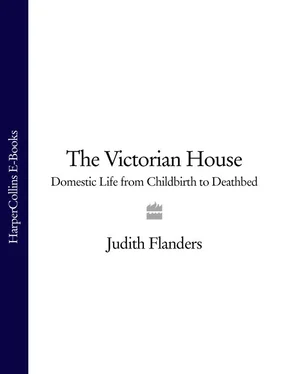Men set the agenda, while it was up to women to carry it through. Men are present often by their absence in the pages that follow, despite the fact that men were undoubtedly the fount from which women’s possibilities grew. It was on marriage that women achieved that great necessity, a home of their own. It is clear, however, that men were barely concerned with the running of the house: ‘Though he may, perhaps, spend less time at home than any other member of the family – though he has scarcely a voice in family affairs – though the whole household machinery seems to go on without the assistance of his management …’ Men were the source of funds, but it was women who judged other women, women who (to the rules of men) made the decisions that activated and continued the social circles that made up the lives of most families. Although there are several fine books on the role of men at home, 23 this will not be another of them. *
Most contemporaries accepted Ruskin’s views on women and home – home was not a place, but a projection of the feminine, an encircling, encouraging, comforting aura that was there to protect a husband and children from the harshness of the world: ‘wherever a true wife comes’, Ruskin wrote, ‘this home is always around her’. 24 Creating a home was the role assigned to women, but it was not something over which they could exercise free will. What made a good home was carefully laid down:
Not only must the house be neat and clean, but it must be so ordered as to suit the tastes of all … Not only must a constant system of activity be established, but peace must be preserved, or happiness will be destroyed. Not only must elegance be called in, to adorn and beautify the whole, but strict integrity must be maintained by the minutest calculation as to lawful means, and self, and self-gratification, must be made the yielding point in every disputed case. Not only must an appearance of outward order and comfort be kept up, but around every domestic scene there must be a strong wall of confidence, which no internal suspicion can undermine, no external enemy break through. 25
No small task, and success or failure would be laid entirely at the door of Mrs Ellis’s ‘Women of England’.
Coventry Patmore’s best-selling The Angel in the House (1854–63) portrayed women as passive and self-abnegating, while his men were driven by a desire to achieve. Housework was ideal for women, as its unending, non-linear nature gave it a more virtuous air than something which was focused, and could be achieved and have a result. Gissing allowed Edward Widdowson a certain naivety in order that the novelist might express a more cynical view: ‘Women were very like children; it was rather a task to amuse them and to keep them out of mischief. Therefore the blessedness of household toil, in especial the blessedness of child-bearing and all that followed.’ 26 Women’s household achievements had more to them than simple cleanliness: Arnold Bennett, in The Old Wives’ Tale (1908), set in the Potteries in the second half of the century, shows a drunken woman, about whom the narrator reflects in horror: ‘A wife and mother! The lady of a house! The centre of order! The fount of healing! The balm for worry and the refuge of distress!… She was the dishonour of her sex, her situation, and her years.’ 27 It was in failing in these roles that she was repulsive, not in the act of drunkenness itself, which Bennett shows several times in men with condemnation but not with disgust.
Housekeeping was a source of strength for women, through which they could somehow mystically influence their husbands. In Dickens’s Bleak House (1852–3) the Jellyby home is going to ruin because Mrs Jellyby is more interested in her charitable works in Africa than in her own family. And it is not only the housekeeping that is affected by her absence of purpose at home: her daughter Caddy warns that ‘Pa will be bankrupt before long … There’ll be nobody but Ma to thank for it … When all our tradesmen send into our house any stuff they like, and the servants do what they like with it, and I have no time to improve things if I knew how, and Ma don’t care about anything, I should like to make out how Pa is to weather the storm.’ 28 Mr Jellyby’s impending bankruptcy is to be laid entirely at the door of his wife’s bad housekeeping.
Good housekeeping improved more than just the house. Caddy Jellyby is teaching herself how to run a house: ‘I can make little puddings too; and I know how to buy neck of mutton, and tea, and sugar, and butter, and a good many housekeeping things. I am not clever at my needle yet … but perhaps I shall improve, and since I have been engaged … and have been doing all this, I have felt better-tempered, I hope, and more forgiving.’ 29 She has become a better person through good housekeeping. The virtues that orderly housekeeping could bring about were almost unending. When in 1860 the child Francis Kent was murdered in a middle-class family home, the shock was not only at the brutal murder, but also because ‘It is in this case … almost certain that some member of a respectable household – such as your’s reader or our’s [sic] – which goes to church with regularity, has family prayers, and whose bills are punctually settled, has murdered an unoffending child.’ 30 Note the ingredients that make up a respectable household: church, family, prayer and prompt bill-paying.
The well-kept house directed men as well as women towards the path of virtue, while the opposite led them irretrievably astray. Most of the published warnings were for the working classes, who were always considered more likely to err:
The man who goes home from his work on a Saturday only to find his house in disorder, with every article of furniture out of its place, the floor unwashed or sloppy from uncompleted washing, his wife slovenly, his children untidy, his dinner not yet ready or spoilt in the cooking, is much more likely to go ‘on the spree’ than the man who finds his house in order, the furniture glistening from the recent polishing, the burnished steel fire-irons looking doubly resplendent from the bright glow of the cheerful fire, his well-cooked dinner ready laid on a snowy cloth, and his wife and children tidy and cheerful … the man who has a clever and industrious wife, whose home is so managed that it is always cosy and cheerful when he is in it, finds there a charm, which, if he is endowed with an ordinary share of manliness and self-respect, will render him insensible to the allurements of meretricious amusements. 31
Working-class men who were not properly looked after by their wives retired to the pub. And, if their houses were not kept to a suitable level of comfort, even sober middle-class men were expected to vanish, although more likely to their clubs than to pubs. In East Lynne, Mrs Henry Wood’s wonderful 1861 melodrama of love betrayed, the second Mrs Carlyle, wife to a successful lawyer, is quite sure that if children are too much in evidence at home, ‘The discipline of that house soon becomes broken. The children run wild; the husband is sick of it, and seeks peace and solace elsewhere.’ She does not blame the husband, but the wife who is operating ‘a most mistaken and pernicious system’. 32 Advice books echoed Mrs Carlyle: ‘Men are free to come and go as they list, they have so much liberty of action, so many out-door resources if wearied with in-doors, that it is a good policy … to make home attractive as well as comfortable.’ 33
The attractive, tastefully appointed house was a sign of respectability. Taste was not something personal; instead it was something sanctioned by society. Taste, as agreed by society, had moral values, and therefore adherence to what was considered at any one time to be good taste was a virtue, while ignoring the taste of the period was a sign of something very wrong indeed. * Conformity, conventionality, was morality. Christopher Dresser, a designer and influential writer on decorative arts, promised that ‘Art can lend to an apartment not only beauty, but such refinement as will cause it to have an elevating influence on those who dwell in it.’ 35 The house, and its decoration, was an expression of the morality that resided within. Mrs Panton, a prolific advice-book writer, was ‘quite certain that when people care for their homes, they are much better in every way, mentally and morally, than those who only regard them as places to eat and sleep in … while if a house is made beautiful, those who are to dwell in it will … cultivate home virtue’. 36
Читать дальше












